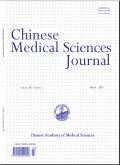Linggui Zhugan Decoction Improves High Glucose-Induced Autophagy in Podocytes
Q2 Medicine
引用次数: 0
Abstract
Objective
To explore the influence of Linggui Zhugan Decoction (LGZGD) on high glucose induced podocyte autophagy.
Methods
LGZGD containing serum was prepared by intragastric administation of 4.2 g/kg (low dose), 8.4 g/kg (medium dose), and 12.6 g/kg (high dose) LGZGD into SD rats respectively. MPC5 and AB8/13 podocyte cells were treated with 60 mmol/L glucose to establish diabetic nephropathy podocyte model in vitro. Both podocytes were divided into control group, high glucose group, low dose LGZGD group, medium dose LGZGD group, and high dose LGZGD group, respectively. For the three LGZGD groups, before LGZGD intervention, podocytes were treated with 60 mmol/L glucose for 3 days. After treated with LGZGD containing serum, cells were collected to analyze cell migration using Transwell assay, proliferation using CCK8, apoptosis and cell cycle using flow cytometry, autophagosome formation using transmission electron microscopy, and expression levels of Beclin-1, Atg5, LC3II/I, and P62 proteins using Western blot.
Results
Compared with the control group, the proliferation and migration of MPC5 and AB8/13 cells in the high glucose group slightly decreased, whereas these parameters restored after intervention with low and medium concentrations of LGZGD, with the medium dose LGZGD having the better effect (P < 0.05). Flow cytometry showed that the medium dose LGZGD group had a significantly lower apoptosis rate (P < 0.05) and higher survival rate (P > 0.05) compared to the high dose LGZGD group. High glucose arrested podocytes in G1 phase, whereas LGZGD shifted podocytes from being predominant in G1 phase to G2 phase. High dose LGZGD significanly reduced high glucose-increased autophagosome formation in both podocytes (P < 0.05). Western blot analysis showed that Beclin-1, Atg5, LC3II/I, and P62 expressions were increased in MPC5 cells treated with high glucose and reversed after adminstration of low and medium doses of LGZGD (P < 0.05).
Conclusion
LGZGD reduced apoptosis and enhanced autophagy in high glucose treated podocytes via regulating Beclin-1/LC3II/I/Atg5 expression.
灵桂术甘煎剂能改善高血糖诱导的荚膜细胞自噬现象
方法 分别给 SD 大鼠胃内注射 4.2 g-kg-1(低剂量)、8.4 g-kg-1(中剂量)和 12.6 g-kg-1(高剂量)含血清的 LGZGD。用 60 mmol/L 葡萄糖处理 MPC5 和 AB8/13 细胞,在体外建立糖尿病肾病荚膜细胞模型。荚膜细胞、MPC5和AB8.13分别被分为对照组、高葡萄糖组、低剂量LGZGD组、中剂量LGZGD组和高剂量LGZGD组。三个 LGZGD 组在使用 LGZGD 之前,先用 60 mmol/L 葡萄糖处理荚膜细胞 3 天。用含血清的 LGZGD 处理后,收集细胞,用 Transwell 试验分析细胞迁移,用 CCK8 分析细胞增殖,用流式细胞术分析细胞凋亡和细胞周期,用透射电子显微镜分析自噬体的形成,用 Western 印迹分析 Beclin-1、Atg5、LC3II/I 和 P62 蛋白的表达水平。结果 与对照组相比,高糖组 MPC5 和 AB8.13 细胞的增殖和迁移能力略有下降,而使用中低浓度 LGZGD 干预后,这些指标均得到恢复,其中中剂量 LGZGD 的效果最好。流式细胞术分析表明,与高剂量组相比,中剂量 LGZGD 组的凋亡率较低(P < 0.05),存活率较高(P > 0.05)。高糖使荚膜细胞停滞在 G1 期,而 LGZGD 则使荚膜细胞从 G1 期占优势转变为进入 G2 期。高剂量 LGZGD 显著减少了两种荚膜细胞因高糖而增加的自噬体形成(P < 0.05)。Western印迹分析表明,高糖处理的MPC5细胞中Beclin-1、Atg5、LC3Ⅱ/Ⅰ和P62表达增加,而中低剂量的LGZGD可逆转这些表达(P < 0.05)。结论 LGZGD通过调节Beclin-1/LC3Ⅱ/I/Atg5的表达,减少了高糖处理的荚膜细胞的凋亡并增强了其自噬能力。
本文章由计算机程序翻译,如有差异,请以英文原文为准。
求助全文
约1分钟内获得全文
求助全文

 求助内容:
求助内容: 应助结果提醒方式:
应助结果提醒方式:


